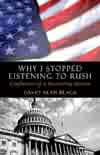|
restoring our biblical and constitutional foundations
|
The Future of the Church
No one can ignore the disturbing parallels between the Third Reich and modern America. The dominant political ideology in the United States today is a neurotic nationalism driven by nationalistic messianism. Just as Hitler called on the Germans to fulfill “the mission appointed for them by the Creator of the Universe,” so our present national government sees America as the “wonder-working” power of God, created to impose democracy upon Arab and Islamic nations that have never known democracy. All the mistakes of Britain’s empire-lust are being repeated by our elites, from the hubris of power to the alienation of allies to the waging of wars where no vital U.S. interests are at stake.
In this situation only a small minority of evangelical Christians are prepared to speak and act out their dissent, and they do so in the face of increasing hostility and occasional repression from the state. Perhaps we could say that evangelicals fall into three categories today: a minority who seek to be faithful to the Word of God and are working against the stream of unethical and unconstitutional government policies; a silent majority condoning these policies or refusing to recognize political sin; and finally those who distort the Word of God and turn the Gospel into a theological appendage to the government’s nationalist ideology.
It is in this context of phlegmatic churches, intensifying intimidation, and the repression of Christian dissent that reformers are struggling to sharpen their analysis and to increase their tenuous leverage on the historical situation. This they try to do by working and writing against the sharply increasing politicization of the evangelical church. It seems obvious that this strategy will involve an escalating confrontation between at least some Christians and the state and, in the longer run, perhaps a major church-state confrontation. Such a confrontation would, I believe, be healthy for the church and might yet save the country from the retributive Justice that would inevitably follow should the statism of evangelicalism continue.
One organization that is working to restore America to her biblical and constitutional foundations is the Constitution Party (CP), whose leaders are meeting this weekend in Nashville. While the major evangelical denominations are hardly vigorous in their support for the CP and only belatedly are starting to fight their own internal battles over politics, the CP faithfully carries on the struggle, knowing it can expect little support from either the evangelicals in the current government in Washington or from local or state politicians.
Some have recently complained about the apparent inability of the CP to move believers to new frontiers of commitment. There is a real danger, they suggest, that its influence will be like King Log – one big splash, then a few ripples, and finally a tranquil pond once more. It is a paper tiger, they say – a domestic tabby. As we saw in the last election, however, the situation is not quite so bleak. The CP presidential/vice-presidential ticket received 30 % more votes than it did in 2000, and new initiatives are underway to boost its morale. In addition to establishing a viable political alternative to the compromised Republican Party, the intention of the CP is to work with biblically- and constitutionally-minded people at the grass roots level in every state to extend its vision of “God, Family, Republic.” As more and more Christians come to recognize statism for what it is and are willing to judge political sin to be a denial of the one Word of God, the church will be more capable to fulfill its responsibility to be an institution that offers the only hope for societal transformation. Younger believers in particular will become more conscious of the failings of government do-goodism and will reject their elders’ all too obvious unwillingness to confront the state on matters of public policy. New generations of students will also discover their own past and recognize themselves as heirs to a long tradition of protest against tyranny that dates back to the Revolutionary War.
Tragically, we can no longer expect the church
hierarchies to provide the lead in confronting government; they are far
too busy protecting their own interests. Even if biblical principles
inform their consciences, making them
 increasingly
uneasy about our warfare/welfare society, the vast majority will continue
to be less than zealous to engage in confrontation or to exert pressure to
change.
increasingly
uneasy about our warfare/welfare society, the vast majority will continue
to be less than zealous to engage in confrontation or to exert pressure to
change.
Humanly speaking, the future of the church and indeed of the country depends on the emergence of a new generation of evangelicals who will fearlessly exert constructive pressure on Christians within government and help them recognize that their neo-imperial policies are an egregious breach of faith. God willing, it is this coming generation of conservatives, as unfulfilled with the status quo as we were when we were young, who will return the church to the roots of its Christian role in relation to government – especially that of its prophetic witness.
December 7, 2004
David Alan Black is the editor of www.daveblackonline.com. He is the author of Why I Stopped Listening to Rush and numerous other books.